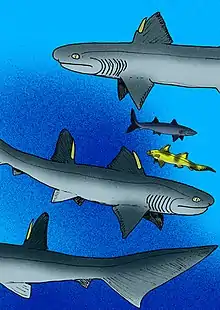Kaibabvenator
Kaibabvenator swiftae is a very large, extinct ctenacanthiform fish hat lived in marine environments in what is now Arizona, during the Middle Permian Period.[2] K. swiftae is known from large teeth up to 30 millimeters long found in the Kachina Microsite, of the lower Fossil Mountain Member, in the Kaibab Formation near Flagstaff, Arizona.[1] The specific name honors researcher Sandra Swift for her paleontological contributions to Northern Arizona University.[1]
| Kaibabvenator Temporal range: Permian, | |
|---|---|
 | |
| Comparison of K. swiftae, Diablodontus, and Glikmanius | |
| Scientific classification | |
| Kingdom: | |
| Phylum: | |
| Class: | |
| Subclass: | |
| Order: | |
| Family: | |
| Genus: | †Kaibabvenator Hodnett, Elliot, Olson & Wittke, 2012[1] |
| Species: | †K. swiftae |
| Binomial name | |
| †Kaibabvenator swiftae | |
References
- Hodnett, John-Paul M.; Elliott, David K.; Olson, Tom J.; Wittke, James H. (2012). "Ctenacanthiform sharks from the Permian Kaibab Formation, northern Arizona". Historical Biology. 24 (4): 381. doi:10.1080/08912963.2012.683193. S2CID 85332499.
- "†Kaibabvenator Hodnett et al. 2012 (elasmobranch)". fossilworks.org. Retrieved 27 August 2023.
This article is issued from Wikipedia. The text is licensed under Creative Commons - Attribution - Sharealike. Additional terms may apply for the media files.